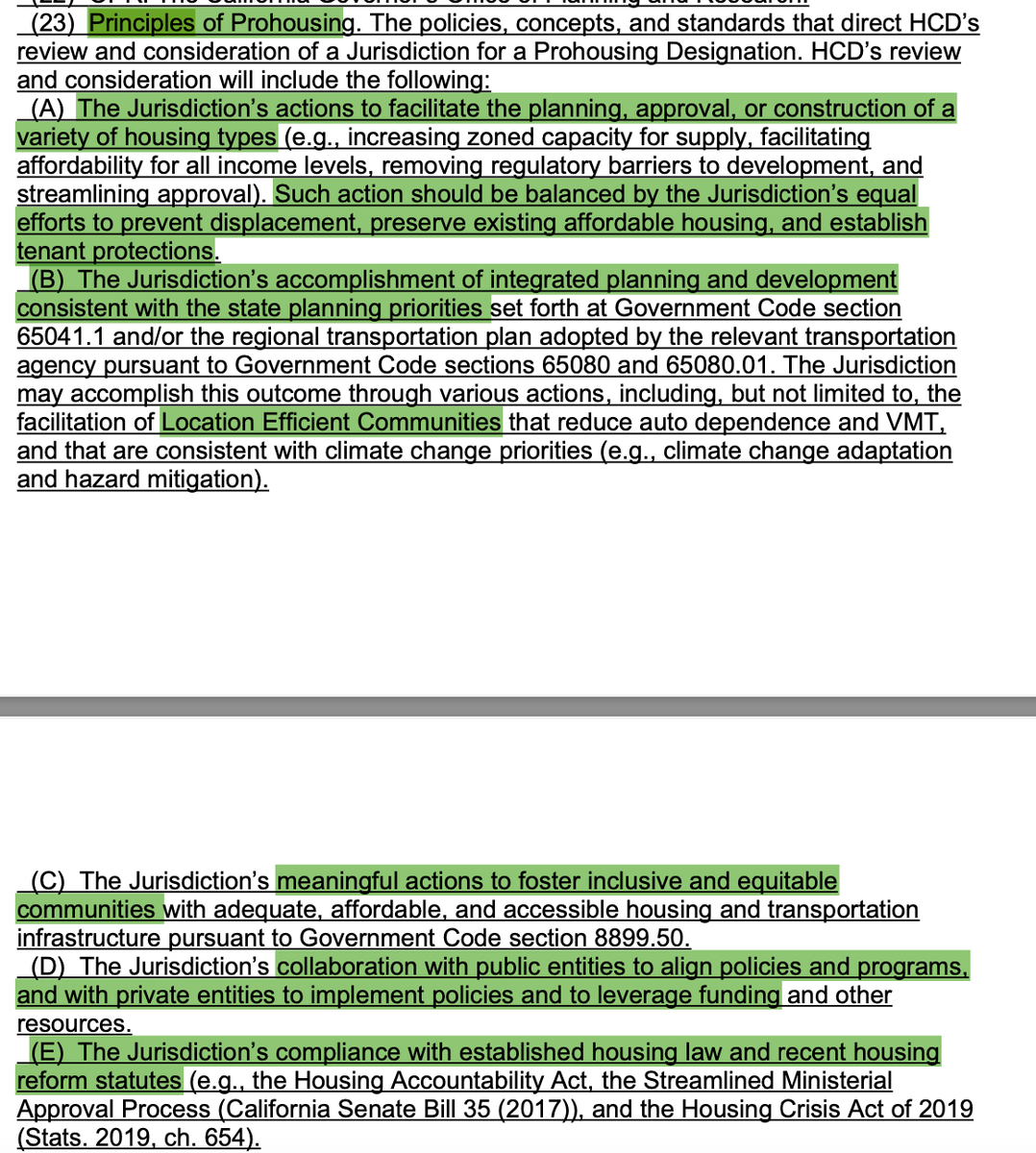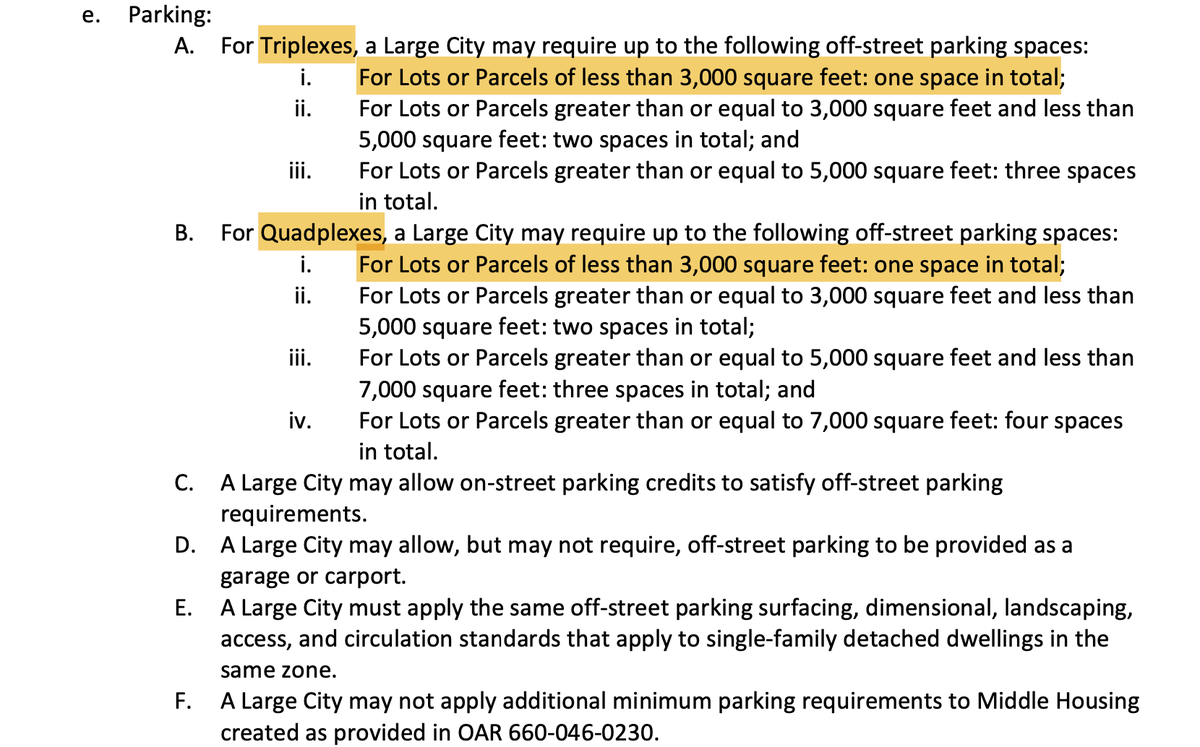
@California_HCD's draft Prohousing Policy regs are out for public comment!
They're emergency regs, so comment period is very short. If you have feedback, send it in NOW.
This thread provides a quick summary. /1
hcd.ca.gov/community-deve…
They're emergency regs, so comment period is very short. If you have feedback, send it in NOW.
This thread provides a quick summary. /1
hcd.ca.gov/community-deve…
The regs establish criteria for cities to receive a "prohousing" designation. Cities that earn the designation get bonus points for other grants. /2
(And if AB 215 passes, cities that are poor performers over 1st half of planning cycle will lose their housing element certification unless they apply for & receive the "prohousing" designation.) /3
To earn the designation, cities must adopt prohousing policies in 4 areas: zoning reform, permitting reform, fees & costs, and financial subsidies. Notably, cities *do not* have to demonstrate that they're prohousing as revealed by outcomes...outcomes don't figure in at all. /4
Within each domain, cities are given a menu of policy options. A first-tier policy on the menu is worth 3 points, a 2d tier policy 2 points, and a 3d tier policy 1 point. Cities must score at least 30 points to earn the Prohousing designation. /5
There are lots of good ideas on the menus. However, scoring isn't tied to share of city's buildable land covered by each policy (or to outcomes), so it's possible that some cities will earn the designation through creation of small "prohousing policy zones." /6
Also, many of the menu items are directional reforms (e.g., "reduce fees"), rather than standards, so if the starting point is very bad, the policy after the reform may still be bad. /7
The operative theory of change seems to be, "Let's get cities to adopt some good policies in some districts. Once the city gets familiar with the good policies, the good stuff will spread to other parts of the city and its neighbors." It's a gamble, though not a crazy gamble. /8
The *best* part of the new regs is this: HCD may withdraw prohousing designation if the city takes any substantial action "objectively in conflict with the Principles of Prohousing." /9 



This gives HCD ongoing supervisory authority over cities that receive the designation, similar to supervising implementation of housing elements but for technical reasons easier to exercise. /10
The *worst* part of the regs is that the prohousing designation is permanent until revoked. It would be much better to make it temporary, say, 3 years, b/c the designation is based on policy change not outcomes. /11
By making the designations temporary, HCD would buy itself time to develop a system for scoring cities based on outcomes. Then, regs could be revised to allow cities to earn and keep Prohousing designation so long as they're good producers of housing. /12
(For ideas about outcome-based metrics, see
papers.ssrn.com/sol3/papers.cf…;
mercatus.org/publications/h…; and
papers.ssrn.com/sol3/papers.cf…;
mercatus.org/publications/h…; and
https://twitter.com/salimfurth/status/1238489619563495425?lang=en) /13
Congrats to @California_HCD for launching these regs. They're a worthy first step, and will likely inform the Biden Administration's race-to-top grants program. 14/end
vox.com/22369761/biden…
@JerusalemDemsas @salimfurth @ebwhamilton @ProfSchleich @kookie13 @sarabronin
vox.com/22369761/biden…
@JerusalemDemsas @salimfurth @ebwhamilton @ProfSchleich @kookie13 @sarabronin
@RickHills2 @dillonliam @SFjkdineen @hanlonbt @NeverSassyLaura @louismirante @SonjaTrauss @e_baldi @solomonout @CamnerLeonora @anthonydedousis @JohnInfranca @VickiBeen @n_kazis @Noahpinion @elpaavo @mc_lens @MichaelManvill6 @BenTMetcalf @metrosolomon
• • •
Missing some Tweet in this thread? You can try to
force a refresh






